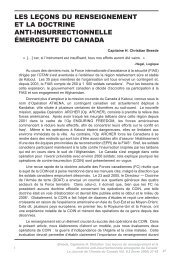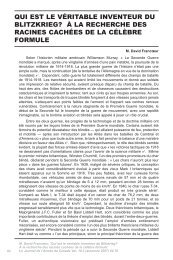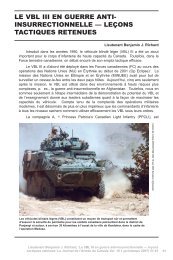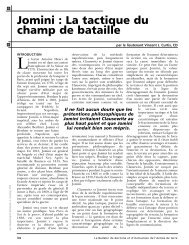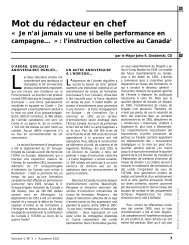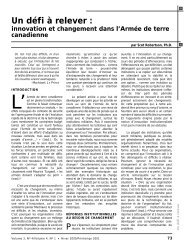The Canadian Army Journal
The Canadian Army Journal
The Canadian Army Journal
Create successful ePaper yourself
Turn your PDF publications into a flip-book with our unique Google optimized e-Paper software.
contracting of MPFs to provide armed services to the CF and other government<br />
departments.<br />
This inevitability argument is captured well in the works of retired US <strong>Army</strong> officers<br />
and academics Don Snider and Gayle Watkins. While privatized logistics support has<br />
been around the US military and other militaries for some time, the trend towards<br />
privatizing training is a recent phenomenon. <strong>The</strong>y argue that in the case of the US<br />
military, the ideological drive towards privatization, the post-Cold War downsizing, and<br />
concurrent increase in operations carried out by the US, has led policy makers to<br />
increasingly turn to private contractors to carry out their foreign military training<br />
programs. 30 Along with this move towards privatizing foreign military training, initiatives<br />
were launched to transfer education and training of recruit and enlisted forces to private,<br />
non-military entities. <strong>The</strong> US <strong>Army</strong> justified this move into the traditional field of training<br />
by arguing that in the midst of downsizing, core capabilities (i.e., combat) would be<br />
protected by hiring out training. 31<br />
This downsizing and ideological bent has also led the US to contract out what would<br />
be considered core combat functions to MPFs. Iraq has seen an increase in the use of<br />
MPFs in support of the US military, and indeed other US government departmental<br />
missions in Iraq. Private military firms have moved from logistics support, to training<br />
support, to a small number of firms that have provided armed personnel that operate with<br />
troops on the battlefield. 32 In his book A Bloody Business, retired Green Beret Gerald<br />
Schumacher describes two types of security contractors operating in Iraq: those<br />
contracted by the US State Department and those providing security for other coalition<br />
operations. <strong>The</strong> State Department contractors are highly regulated and all MPFs<br />
operated under the authority of the Coalition Provisional Authority (CPA), ostensibly the<br />
US Military, at least until the handover of sovereignty to the Iraqi government. As David<br />
Isenberg points out in his report on PMCs in Iraq , while the Iraqi government is now de<br />
jure in charge since the end of the CPA, its sovereignty is largely in name only. 33 While<br />
MPFs as stated only make up a small number of the overall contractors being employed<br />
in theatre, they are heavily armed and have been involved in combat. 34 Thus, the US<br />
has seen an evolution in contractor support, moving from MSFs to the provision of<br />
training both foreign and domestic forces in areas considered “core capabilities” by<br />
MCFs. <strong>The</strong> final step has seen the employment of MPFs in Iraq, often armed,<br />
sometimes involved in the ultimate core capability—combat.<br />
<strong>Canadian</strong> Contractor Aumentation Program<br />
<strong>The</strong> <strong>Canadian</strong> military’s experience has been similar, if somewhat more cautious in<br />
its embrace of contractor support, to its allies. Similar to the US, the UK, Australia and<br />
some European Union nations, the first military function to move significantly into the<br />
realm of contractor support was logistics. While the CF has used MSFs in the past, such<br />
as the Contractor Support Program, which ran from 2000 to 2003, a good example of<br />
contractor support in use today is the <strong>Canadian</strong> Forces Contractor Augmentation<br />
Program (CANCAP), which came into existence in December 2002. 35 Along with the<br />
downsizing of the CF in the post-Cold War 1990s there was a commensurate increase<br />
in the rates of deployment of CF members abroad. <strong>The</strong>se two factors combined to put<br />
a severe strain on a number of military logistics occupations, which put at risk the ability<br />
of the CF to sustain the high operational tempo they were operating under. CANCAP<br />
was initiated to provide “a pre-facilitated theatre support contract with a prime contractor<br />
for mature, low-risk theatres where military expertise is not strictly required.” 36 <strong>The</strong><br />
objectives of CANCAP are as follows:<br />
� To provide the CF with additional operational flexibility through enhanced support<br />
capability.<br />
<strong>Canadian</strong> <strong>Army</strong> <strong>Journal</strong> Vol. 11.1 Spring 2008<br />
87


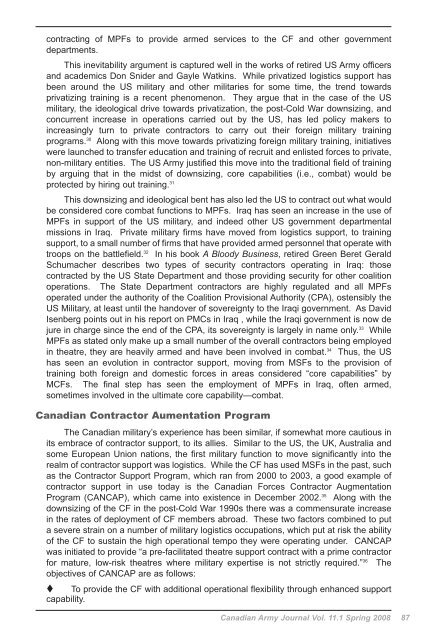
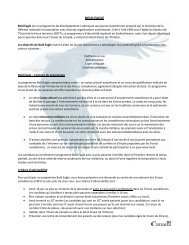

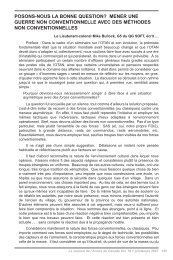

![La modularite dans l'Armee de terre canadienne [pdf 1.6 MB]](https://img.yumpu.com/17197737/1/188x260/la-modularite-dans-larmee-de-terre-canadienne-pdf-16-mb.jpg?quality=85)
